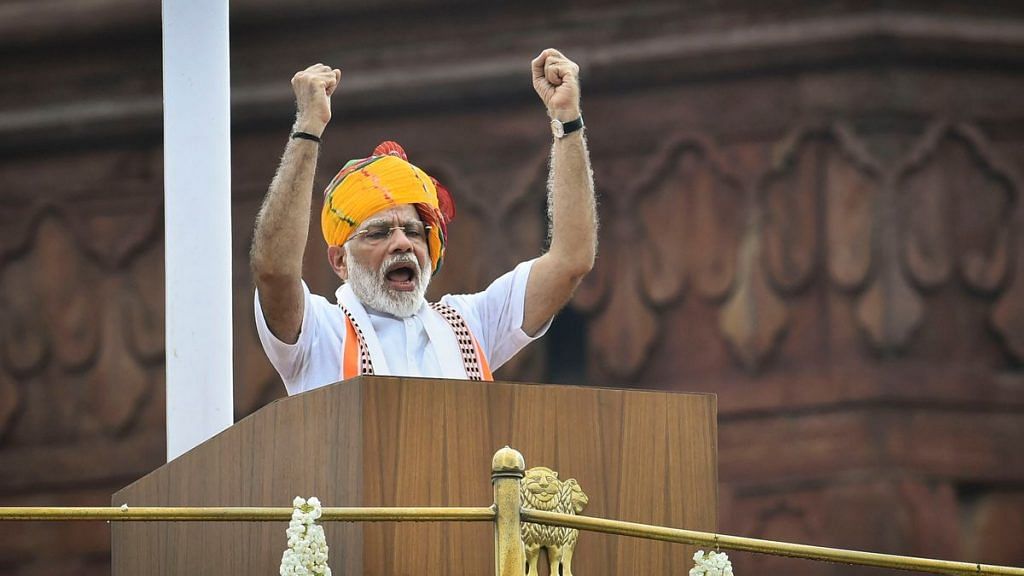The brouhaha over the second Narendra Modi government completing its 100 days has been generated through the many claims of ‘achievements’. If anything, this celebration is premature.
These ‘achievements’ don’t take into account the results, or rather the consequences, of the government’s decisions. But in a New India, we should now get used to ministers calling every move ‘historic’ and their unquestioning supporters amplifying these ‘historic achievements’ through all forms of media.
A fair assessment of the Modi government’s decisions should be done at the end of the term, or at least around December 2021. But neither Narendra Modi nor his posse of ministers led by BJP president Amit Shah has so much patience. They cannot wait that long. They have to declare victory immediately at the end of their first innings of the five-day test match.
If the ruling BJP looks at politics as a match against the opposition parties in general, and the Congress in particular, then that is a big mistake. Modi and Shah do not know what kind of weather will come next or how the pitch will turn subsequently.
Indian cricket fans will never forget the humiliating defeat that their star-studded team suffered at the hands of Bangladesh in the World Cup match in 2007. Or, in the Champions Trophy final against Pakistan 10 years later.
The consequences of Modi government’s so-called ‘historic’ decision to abrogate Article 370 in Jammu and Kashmir – the international community reportedly endorsed the move – are yet to be seen. The ‘win’ in Kashmir could prove to be just as imaginary as the guaranteed victories against Bangladesh and Pakistan.
Also read: Indian economy’s animal spirits got worse as slowdown spilled into July
Manufacturing reality
Only 100 days have gone by, and nearly 1,600 days of Modi government’s second term still remain. There is plenty of time for the climate to change. The economy has just entered the dark tunnel, and there hardly seems to be any sign of light at the end. You may blame global conditions for it, it wouldn’t change things for the young Indians who are battling a ‘recession’. You need more than Amit Shah’s political acumen and Narendra Modi’s charisma to bring the economy back on track.
How long will the nationalist fervour and aggressive Hindutva divert people’s attention from unemployment, job losses, crashing rupee and middle-class anxieties? How long will the media continue asking ministers and political leaders what their favourite fruit is?
How long will dilution of the RTI Act or unchecked corruption be tolerated? Will propaganda and manufactured realities, like India is now corruption-free, become the perennial defence of a government that offers no room to any question or alternative viewpoint? India is rapidly becoming an Orwellian society. The number of opposition leaders falling prey to raids by the Enforcement Directorate or the CBI is already reaching a saturation point.
Also read: Difference between Pragya Thakur and LK Advani is only in the shade of Hindutva
Signs of a distant past
A character in John le Carré’s A Perfect Spy says in total dismay, “You should have died when I killed you”. In 1987, driven by a sort of self-righteous outrage, then-Finance Minister Vishwanath Pratap Singh had ordered a series of raids on leading business houses. Initially, he received applause from the middle class and the so-called ‘anti-business’ Left.
Within a year or two, even the Socialists turned against him. The famous socialist leader N.G. Goray held a public rally in Pune condemning the witch-hunt of industrialists and holding the economy to ransom. Then-Prime Minister Rajiv Gandhi was forced to shift V.P. Singh from the finance ministry to the defence. But the latter remained notorious in his new role too.
The HDW submarine scandal and later the Bofors scam became the templates on which V.P Singh ran the 1989 electoral campaign. The Janata Dal-led National Front coalition defeated Rajiv Gandhi’s Congress and V.P. Singh became the Prime Minister.
When the CBI in March 1990 reopened the HDW submarine case, Singh’s stature grew, earning him the epithet of “Super Clean”. But soon the bubble burst.
The weather conditions changed, and the BJP’s Ayodhya movement began to take the centre stage. Ignoring opposing voices within the party, V.P. Singh decided to implement the Mandal Commission’s report that had been biting dust for several years.
On the face of it, the aim was idealistic – to promote social justice – but the ‘noble’ objectives of the Mandalisation resulted in an explosion of caste politics, with upper castes launching violent protests against quota for the Other Backward Classes. The move marked the beginning of the fall of V.P. Singh.
Also read: 7 politicians with corruption charges CBI and ED won’t raid
Crisis is here
Today, the ED and the Income Tax raids and the Stalinist-style inquiries have raised alarm bells in the business community. The corporate class is restless. Although it speaks of its fears and frustrations in private, the quarterly and mid-year balance sheets are loud and clear. The fall of the rupee is a cry of agony. The Reserve Bank of India can rescue the rupee but it cannot control the Fed rates in the US. The Bombay Stock Exchange and the Nifty could be managed by roping in LIC and other public sector enterprises, but only up to a point.
In terms of cure, the Modi government has so far offered little. Anyone afraid of ghosts – political, economic, social or cultural – can chant ‘Jai Sri Ram’ to provide the self with a semblance of confidence and hope. But modern-day ghosts don’t disappear just like that. The spectre of economic crisis looms large and it will need more than a prayer to tackle it.
The author is a former editor and Congress member of Rajya Sabha. Views are personal.
